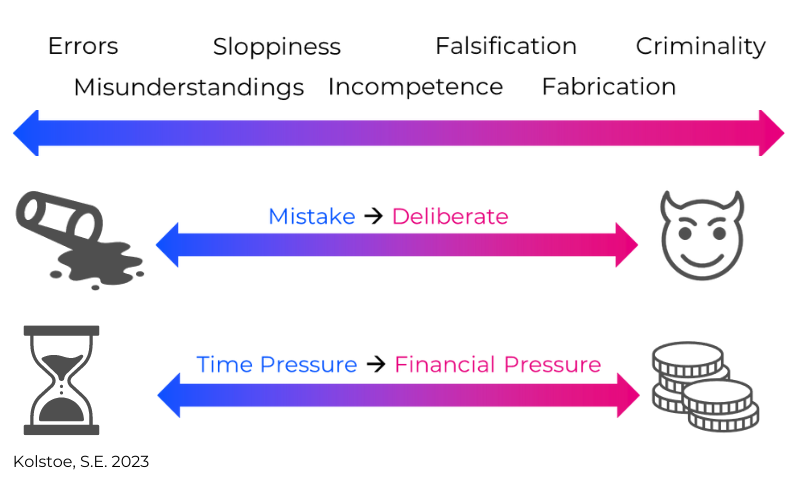
Questionable Research Practices
Questionable Research Practices https://opusproject.eu/wp-content/uploads/2024/04/Simon-Kolstoe-QRPs-image.png 800 500 Open and Universal Science (OPUS) Project Open and Universal Science (OPUS) Project https://opusproject.eu/wp-content/uploads/2024/04/Simon-Kolstoe-QRPs-image.pngResearch, a fundamental human endeavor, is susceptible to errors and lapses in judgment. Despite the emphasis on the robustness of research methods, the competitive nature of academia sometimes leads researchers to engage in questionable practices to gain an edge in funding, jobs, or prestige. While research misconduct typically involves clear breaches like data manipulation, fabrication, or plagiarism, it’s essential to recognize a broader spectrum of Questionable Research Practices (QRPs) that can compromise the integrity of scientific inquiry.
Rather than viewing QRPs as a distinct category from misconduct, it’s more constructive to see them as behaviors ranging along a spectrum from inadvertent mistakes to deliberate malfeasance. This perspective acknowledges that anyone involved in research can, at times, veer into questionable territory. It underscores the collective responsibility of the research community to identify and address QRPs to uphold research integrity.
The spectrum concept elucidates how seemingly innocuous missteps can escalate into serious misconduct. Minor errors, if unchecked, may culminate in attempts to conceal mistakes, leading to fraud or even criminal behavior. Recognizing this progression informs strategies to mitigate QRPs’ impact. Adherence to rigorous methodologies, proficiency in statistical analysis, and transparent data sharing emerge as crucial safeguards against QRPs’ encroachment.
Moreover, understanding the causes of QRPs informs preventative measures. Time constraints may predispose researchers to honest errors, necessitating meticulous methodological adherence. Financial pressures, on the other hand, heighten the risk of more egregious misconduct, necessitating vigilant oversight. By acknowledging QRPs as a continuum, researchers and stakeholders are reminded of the perpetual vigilance required to safeguard research quality.
Addressing QRPs isn’t merely about policing individual transgressions but embodies a collective commitment to fostering a culture of research integrity. By promoting transparency, accountability, and adherence to ethical standards, the research community upholds its commitment to producing reliable and trustworthy knowledge.
This article, distributed under a Creative Commons license, underscores the importance of confronting QRPs as a fundamental aspect of promoting research integrity. Acknowledgments extend to colleagues for their contributions to this discourse.
DOI: https://doi.org/10.37672/UKRIO.2023.02.QRPs
Photo via Simon Kolstoe
- Posted In:
- Open Science News




